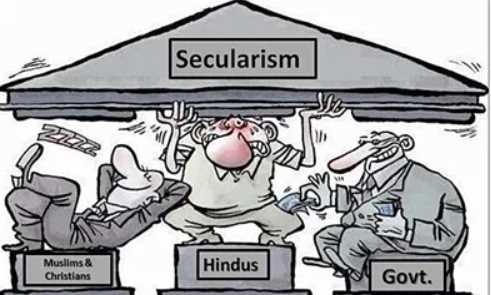The Constitution of India defines secularism as follows:
'The State is prohibited from discriminating against any citizen solely on the basis of their religion, race, caste, sex, place of birth, or any combination of these.
'No person shall be required to pay taxes by the State in order to advance any particular religion.'
'No person shall be denied the equal protection of the laws on the ground of religion alone.'
Nothing in this article 'shall prohibit the State from making any particular provision for the improvement of any class of citizens who are socially and educationally backward, or for the Scheduled Tribes.'
The Constitution also contains several other provisions which guarantee equality of all citizens before the law and prohibit discrimination on the grounds of religion, race, caste, or sex.
The Constitution of India does not define secularism in terms of the separation of religion and State. It only prohibits discrimination on the grounds of religion and guarantees equality for all citizens before the law.
The Constitution of India does not explicitly define the term 'secularism'. However, the Preamble to the Constitution and several of its articles reflect the spirit of secularism.
The Constitution of India gives all religions equal status.
Article 25 guarantees freedom of conscience and free profession, practice, and propagation of religion.
Article 26 provides that subject to public order, morality, and health, every religious denomination or any section thereof shall have the right to establish and maintain institutions for religious and charitable purposes, and to manage its own affairs in matters of religion.
The right to equality of all citizens before the law and equality of opportunity in matters of public employment are guaranteed by Articles 14 and 15.
Article 16 provides for equality of treatment in public employment without regard to religion, race, caste, sex, or place of birth. The Constitution prohibits discrimination on grounds of religion, race, caste, sex, or place of birth in Articles 15 and 16. It also prohibits untouchability and forbids begar (forced labor). The State is enjoined to promote international peace and security, maintain just and honorable relations between nations, and foster respect for international law and treaty obligations in the relations between States. The State shall endeavor to promote harmony and goodwill among all the people of India.

Interpretation
The Constitution does not, however, define what secularism means. This has led to a number of different interpretations. One interpretation is that the Constitution requires the state to take a position of 'equal respect' towards all religions. The Supreme Court propounded this interpretation in the case of S.R. Bommai v. Union of India. Another interpretation is that the Constitution requires the state to be neutral towards all religions. The Supreme Court propounded this interpretation in the case of Hindutva's judgment. A third interpretation is that the Constitution does not favor any particular religion. The Supreme Court propounded this interpretation in the case of Durga Das Basu v. State of West Bengal.